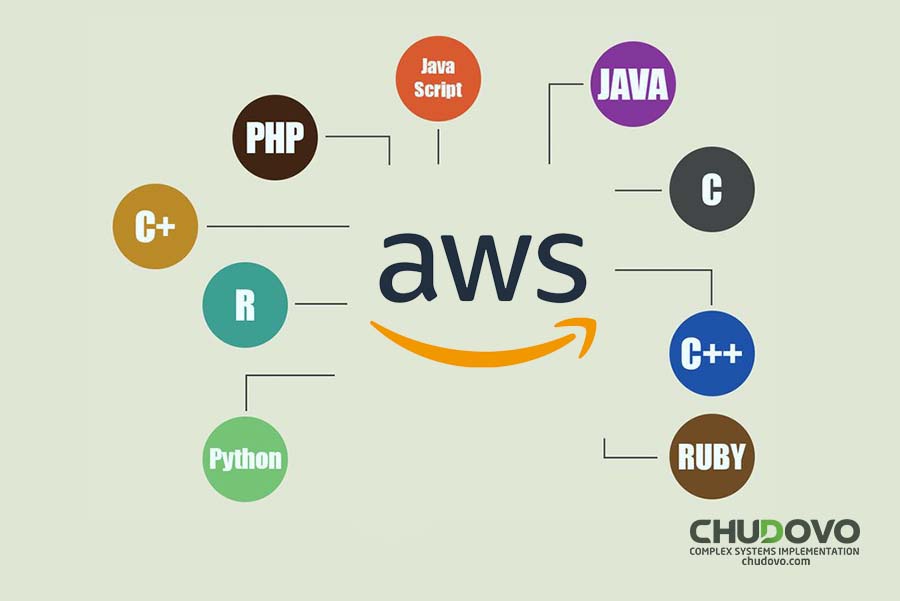Mastering Cloud Computing: Top Programming Languages for AWS
The buzz around cloud computing has been gaining much popularity these days. Cloud computing has transformed the fabric of how businesses approach software, data, and technology solutions. There’s a palpable shift towards cloud-native development from startups to medium and large enterprises. AWS, a pioneer in this realm, stands at the forefront, offering myriad services and tools to aid developers in building robust, scalable applications.
With this increasing popularity comes the question- which programming language should a development team choose for their AWS project? Many programming languages exist, from Python and Java to Ruby and Go. Let’s dive deep to know what makes these programming languages different and what language aligns with your company’s objectives.
Table of content
- The Growing Importance of Cloud Computing
- Understanding the AWS Ecosystem
- Why the Programming Language Matters in AWS
- JavaScript (Node.js)
- Python
- Java
- Go (Golang)
- Ruby
- .NET (C#)
- Conclusion
- FAQ

The Growing Importance of Cloud Computing
The digital age has transformed how businesses operate and serve their clients. One of the most significant shifts in this arena is the move toward cloud computing. But why has it become so pivotal? Imagine a world where companies no longer need to maintain large, on-site data centers or invest heavily in physical hardware. Instead, they can harness the power of the cloud, a vast digital ecosystem that offers scalability, flexibility, and cutting-edge technology solutions.
Businesses can launch applications, store massive amounts of data, and even harness advanced programming capabilities on the cloud. This transition to the cloud is more than just a technological trend; it’s a testament to how software development practices are evolving. Developers now focus on building efficient, cloud-native systems rather than just creating standalone applications. The goal? Make software more responsive, scalable, and in tune with modern business needs.
AWS: A Dominant Player in the Cloud Market
As the conversation around cloud computing deepens, one name consistently stands out: AWS. Amazon Web Services, or AWS, has carved a niche in the cloud landscape. Its comprehensive suite of services, from AWS Data Engineering to various development tools, caters to seasoned programmers familiar with languages like Java, JavaScript, and Python and newcomers looking to get their feet wet.
AWS can offer various services tailored to different project needs, which is the answer. Whether a team is looking to deploy a large e-commerce platform, build a data-intensive application, or work on synchronous and asynchronous functions using TypeScript, AWS provides the necessary resources. The community around AWS is another reason for its dominant image. Many blogs, tutorials, and learning resources guide developers’ AWS development journey. The platform’s emphasis on cloud-native development ensures that businesses can adapt to market changes swiftly, making AWS a preferred choice for many.

Understanding the AWS Ecosystem
At its core, AWS provides an infrastructure that enables developers and teams to deploy, manage, and scale applications without the hassles of traditional hardware management. This is the magic of cloud computing. But AWS isn’t just about storage; it offers a palette of services tailored for different software development needs. Have you ever heard of teams raving about AWS Data Engineering? Or you’ve stumbled upon a blog where programming enthusiasts discuss the merits of using Java or JavaScript on AWS.
This versatility stems from AWS’s extensive list of services. AWS has a tool whether you’re keen on building a cloud-native application using Python, managing large datasets, or even dabbling in synchronous or asynchronous tasks with TypeScript. It’s like a treasure chest, filled with tools and libraries, waiting for developers to explore.
Key Characteristics and Features
Beyond its services, the AWS ecosystem is known for certain unique traits that make it stand out in the crowded cloud market. Here are a few:
Maintainability
With AWS, the focus isn’t just on creating; it’s also on sustaining. The platform ensures that the software remains easy to manage and update, ensuring long-term success for businesses.
Comprehensive Development
The development process on AWS is holistic. From coding to deployment, every step is supported by a suite of tools that streamline work and enhance efficiency.
Community Support
The AWS community is a vibrant space. Whether you’re a newbie seeking learning resources or a seasoned developer looking for advanced guides, the community has something for everyone.

Why the Programming Language Matters in AWS
Think of AWS as a sprawling digital city, with each service representing a different neighborhood. Now, the programming language you choose is like the vehicle you drive. Some vehicles are better suited to specific neighborhoods, offering smoother rides and more efficient journeys.
For instance, Java might seamlessly integrate with specific AWS tools, making development projects a breeze. On the other hand, JavaScript or TypeScript, with their synchronous and asynchronous capabilities, might better leverage specific AWS functions. A dedicated offshore team specializing in a particular language will often find avenues in AWS that enhance their programming efforts.
Scalability and Performance
Every business dreams of growth. And as they grow, their software needs to scale alongside. Here’s where the choice of language becomes critical. Some languages are inherently more scalable. They can handle large influxes of data, support more extensive applications, and ensure that everything runs smoothly, even during high-demand periods. For instance, while Python is celebrated for its simplicity, it’s also renowned for its scalability in cloud-native development.
Ease of Maintenance and Deployment
No company wants to spend countless hours fixing code or navigating complex deployment processes. The correct programming language can simplify these aspects. With AWS’s vast ecosystem, languages that align well with its services often ensure that maintenance is straightforward and deployment is hassle-free.
It’s not just about writing code; it’s about ensuring that this code remains easy to manage and can be smoothly transitioned from a development environment to a live setting. In conclusion, while AWS offers many solutions and avenues for developers, the choice of programming language is a foundational decision. It sets the stage for how efficiently a team can navigate the AWS landscape, ensuring that the end product is functional, robust, scalable, and maintainable.

JavaScript (Node.js)
Initially designed as a scripting language for web browsers, JavaScript has grown exponentially. With the advent of Node.js, JavaScript transcended its browser confines, allowing developers to use it for server-side programming. This transformation was monumental; imagine a language primarily used for animating web elements, suddenly capable of powering backend development processes.
Strengths in the AWS Environment
Delving into the AWS environment, one quickly realizes the compatibility Node.js shares with it. The asynchronous nature of Node.js, combined with its event-driven architecture, aligns seamlessly with the cloud-native development approach of AWS. This ensures that applications remain scalable and efficient.
Moreover, AWS offers many tools and services designed to enhance the development experience for Node.js developers. Whether managing data, optimizing functions, or streamlining synchronous and asynchronous tasks, Node.js and AWS are like a well-orchestrated symphony. This synergy makes it a top choice for many dedicated offshore teams specializing in software outsourcing.
Common Use Cases on AWS
Node.js has found its niche in several AWS projects:
Real-time Data Processing
Given its non-blocking I/O operations, Node.js is often the go-to choice for real-time data analytics and processing on AWS.
Serverless Applications
With AWS Lambda, developers can run their Node.js code in response to events without needing traditional infrastructure, optimizing resources and costs.
Web Applications
Building dynamic, scalable web applications on AWS using Node.js ensures businesses can cater to a large audience without compromising performance or efficiency.
Python
As the world of cloud computing evolves, specific programming languages seem tailor-made. Among these, Python shines brightly, especially when paired with the robust offerings of AWS. Let’s delve into the world of Python and discover its magic within the AWS realm.
Why Python is a Favorite for AWS
With its elegant simplicity and versatility, Python has always been the development community’s darling. Its intuitive syntax means that developers, whether seasoned pros or enthusiastic beginners, can craft applications with clarity and efficiency. This translates to quicker project turnarounds and enhanced software maintainability in the AWS ecosystem. Moreover, Python inherently supports both synchronous and asynchronous operations, which align perfectly with cloud-native development on AWS. Whether you’re a small business looking to migrate to the cloud or a large company aiming to optimize your cloud resources, Python offers a streamlined programming experience.
AWS SDK for Python (Boto3)
One must discuss Python on AWS by mentioning Boto3. The bridge connects Python’s simplicity with AWS’s comprehensive services. Boto3 is the AWS SDK for Python, a crucial tool allowing developers to write software that uses AWS offerings like Amazon S3 and Amazon EC2. With Boto3, tasks such as data storage, retrieval, and analysis become straightforward. It encapsulates the complexity of AWS services, letting developers focus on what they do best: crafting impeccable code.
Popular AWS Services that Benefit from Python
Several AWS services particularly shine when powered by Python:
AWS Lambda
With Python, building serverless applications that respond to events becomes a breeze.
AWS Data Engineering
Processing and managing vast datasets are optimized using Python, especially given its rich libraries and tools.
Amazon SageMaker
Python and SageMaker are a match made in heaven, simplifying model building and deployment for those diving into machine learning.
Java
In the diverse landscape of programming languages, Java has consistently held its ground, proving its worth across various platforms and applications. Its strong presence in cloud computing, especially when intertwined with the offerings of AWS, speaks volumes about its versatility and robustness. Let’s journey through Java’s contributions and considerations in the AWS world.
Java’s Role in Enterprise Cloud Computing
Since its inception, Java has been the backbone of numerous enterprise-level applications. Its object-oriented nature and platform independence have made it a favorite for large-scale development. In the world of enterprise cloud computing, Java offers stability and scalability. Imagine having a language that supports the intricate requirements of a large business and ensures that applications remain maintainable and efficient. That’s the advantage Java brings to the table. Java offers a structured yet flexible approach, especially for dedicated offshore teams working on complex cloud-native development projects.
Integrating Java with AWS Services
With its expansive list of services, AWS understands Java’s importance. As a result, there’s a seamless integration mechanism in place. Whether you’re looking at AWS Lambda to run your Java code or diving deep into AWS Data Engineering, there’s a symbiotic relationship between Java and AWS. Utilizing AWS SDKs tailored for Java, developers can access a rich set of libraries and tools, streamlining the development process. This integration ensures that businesses can harness the full power of AWS while working within the familiar confines of their chosen language.
Pros and Cons of AWS Development
Like all things, using Java for AWS development comes with its set of advantages and considerations:
Pros
- Robustness: Java’s object-oriented nature ensures a stable foundation for building intricate applications.
- Community Support: A vast community means extensive learning resources, guides, and troubleshooting support.
- Scalability: Java’s inherent scalability aligns well with AWS’s infrastructure, making it ideal for growing businesses.
Cons
- Performance Overheads: Java applications sometimes experience performance lags, especially when not optimally tuned for the cloud environment.
- Complexity for Beginners: New developers might find Java’s structure more challenging than languages like Python or JavaScript.
Go (Golang)
In dynamic programming, newer languages often emerge, bringing fresh perspectives and solving unique challenges. Among these, Go, affectionately known as Golang, stands out, particularly in cloud computing. Let’s delve deeper into this modern language and its rapport with AWS.
The Rise of Go in Cloud Computing
Emerging from the corridors of Google, Go was developed to address some of the challenges inherent in large-scale software development. With its simplicity, efficiency, and strong support for concurrent programming, Go quickly became a darling of the development community. Cloud computing, emphasizing scalability and performance, found a perfect ally in Go. Its lightweight nature and capability to handle asynchronous tasks efficiently made Go an ideal choice for cloud-native development projects. And as businesses sought robust and elegant solutions, Go’s popularity in the cloud ecosystem surged.
Key Benefits of Using Go in AWS
While Go offers a slew of advantages for general programming, its strengths become even more pronounced within the AWS environment:
Performance
Go’s compiled nature means that it offers blazing-fast execution, a trait that aligns perfectly with the efficiency-driven ethos of AWS.
Concurrency
Handling multiple tasks simultaneously is a breeze with Go, making it ideal for real-time data processing and other concurrent operations on AWS.
Simplicity
With its clean syntax, Go ensures that developers can focus on building applications without getting bogged down by language complexities.
AWS Lambda and Go
One of the most exciting integrations of Go within AWS is its compatibility with AWS Lambda. This service lets developers run their code in response to certain triggers, scaling automatically. With Go’s efficient performance and AWS Lambda’s serverless architecture, businesses can craft solutions that are not only powerful but also resource-efficient. It’s like a match made in the cloud!
Ruby
In the vibrant tapestry of programming languages, Ruby stands out with its elegant syntax, flexibility, and object-oriented nature. Especially within the AWS ecosystem, Ruby carves a unique niche, offering developers a harmonious blend of power and simplicity. Let’s explore this gem of a language and its synergy with AWS.
A Quick Dive into Ruby’s
Developed from a desire for a more intuitive and productive language, Ruby has always prioritized developer happiness. Its syntax reads like English, making the programming experience fluid and enjoyable. For many developers, transitioning from languages like Java or JavaScript to Ruby feels like a breath of fresh air. Its object-oriented foundation ensures that the code remains maintainable, while its dynamic nature fosters creativity and innovation in software development.
AWS Capabilities AWS SDK for Ruby
Navigating the vast seas of AWS becomes a delightful journey with the AWS SDK for Ruby. This dedicated toolkit bridges Ruby’s simplicity with AWS’s robust services, allowing developers to harness the cloud’s full potential seamlessly. Whether you’re looking to store data in Amazon S3, launch a new EC2 instance, or delve into AWS Data Engineering, the SDK ensures that Ruby integrates smoothly with these services. It’s like having a dedicated translator, ensuring that Ruby and AWS speak the same language and work harmoniously.
Use Cases and Best Practices
Ruby, with its rich libraries and gems, offers a wide array of use cases on AWS:
Web Applications
Leveraging frameworks like Ruby on Rails, developers can easily build and deploy scalable web applications on AWS.
Data Processing
Ruby’s intuitive syntax makes data analysis and processing straightforward, especially when integrated with AWS’s data-focused services.
Serverless Functions
With AWS Lambda, Ruby code can be executed in response to specific triggers, optimizing resource usage and costs.
Best practices when using Ruby on AWS include:
- Ensuring efficient error handling to maximize cloud reliability.
- Leveraging Ruby’s gems to enhance functionality without bloating the codebase.
- Regularly updating the AWS SDK for Ruby to leverage the latest features and optimizations.
.NET (C#)
In the diverse realm of programming languages and frameworks tailored for cloud computing, .NET, particularly its primary language, C#, holds a significant place. Bridging the gap between robust enterprise solutions and modern cloud-native development, .NET on AWS offers a seamless blend of performance and productivity. Let’s navigate this harmonious duo and unearth the nuances of using .NET in the AWS environment.
The .NET Framework on AWS
.NET, a brainchild of Microsoft, has always been a beacon of enterprise software development. With its object-oriented solid principles, support for multiple languages (though C# remains the most popular), and a comprehensive library set, .NET offers a robust platform for building scalable and efficient applications. When this powerhouse framework meets the versatile cloud ecosystem of AWS, the result is nothing short of spectacular. AWS recognizes the strength of .NET and provides first-class support, ensuring developers have all the right tools and services.
AWS Tools and SDK for .NET
To streamline the development experience for .NET professionals, AWS offers dedicated tools and an SDK tailored for the .NET framework. This SDK acts as a bridge, connecting the vast AWS services with the .NET environment, ensuring that integrating functionalities like data storage, analysis, or even synchronous and asynchronous operations becomes a breeze. Whether you want to optimize your AWS Data Engineering processes or deploy an extensive enterprise application, the AWS SDK for .NET ensures a smooth, efficient, and integrated development experience.
When to Opt for .NET in AWS
The decision to use .NET in AWS often hinges on a few considerations:
Enterprise Solutions
If you aim to build large-scale, enterprise-level applications, .NET offers the robustness and reliability you seek.
Dedicated Offshore Teams
For teams that already have expertise in .NET, leveraging its capabilities on AWS ensures quicker project turnarounds and better maintainability.
Seamless Integration
If your project demands seamless integration with other Microsoft services or tools, .NET on AWS provides a cohesive solution.

Certified engineers
Convenient rates
Fast start
Profitable conditions
Agreement with
EU company
English and German
speaking engineers
Conclusion
In the advanced world of cloud computing, AWS emerges as a beacon, directing how businesses and developers navigate software development. Though nuanced, selecting the correct programming language is crucial for tapping into AWS’s vast capabilities. While traditional languages like Java and Python remain relevant, new contenders are also making their mark. Crafting AWS solutions combines the right tools, foresight, skill, and flexibility. As the digital era progresses, maintaining agility, staying updated, and fostering continuous learning becomes essential to thrive and innovate in the expansive universe of AWS.
Frequently Asked Questions
What makes a programming language more suitable for AWS?
Specific programming languages have better integrations, support, and toolkits designed explicitly for AWS services. The suitability often depends on the nature of the project, the scalability required, and how well the language can interact with AWS features.
With so many programming languages available, how can one decide on the best fit for an AWS project?
The choice depends on several factors, including the project’s specific requirements, the development team’s expertise, and the desired scalability and performance. The article dives deep into each top language’s strengths and nuances, guiding readers to make an informed decision based on their needs.
Does AWS support emerging or mainstream programming languages like Python, Java, and JavaScript?
AWS supports various programming languages, including both mainstream and emerging ones. However, the depth of integration, available tools, and community support might vary. The article provides insights into various languages and their compatibility with AWS, helping users gauge the best options.
If you need an proven AWS solutions developers at the right price, contact Chudovo Today!




